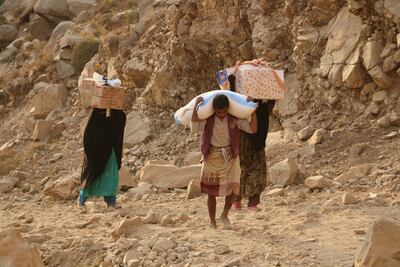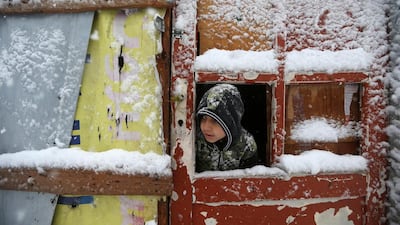In Yemen, where the Houthis are known to have siphoned swathes of humanitarian aid, the UN and other NGOs are often accused of being part of the so-called "war machine" through their continued assistance.
"If you don't intervene at all, the whole population might die, and if you intervene you'll be criticised because part of the assistance hasn't reached its target. It's an ethical dilemma," Khaled Khalifa, UN High Commissioner for Refugees' representative to the GCC, told The National on Monday.
"It's very controversial and there isn't a 100 per cent right or wrong answer, but this is the nature of conflict."
Mr Khalifa was speaking on the sidelines of an event in Dubai's International Humanitarian City, as a coming winter campaign by the Refugee Commission is targeting 3.4 million displaced Iraqis and Syrians in the region.
Yemen is in its eighth year of war since the Houthis took over the capital Sanaa in 2014.
The Houthis now control territory that is home to almost 70 per cent of Yemen's population, of which 73 per cent relies on aid.
"We cannot deny [the Houthis'] existence," a UN aid worker told The National. "They're the ones providing us with security and the ones on the field. Some of the food portions are directed to the front lines. If it's just fraction, some say, let it be." The aid worker declined to be named because he was not authorised to speak to the media.
Yemen has the world's largest population of internally displaced people at 4.3 million.
In 2020, the UN said it was planning to scale back assistance to Yemen after complaints by major donors about the militants obstructing the delivery of aid.
"Aid should be free of any political restraints, it should be impartial and it should be needs-based," UN spokesman Stephane Dujarric said at the time.
Mr Khalifa, who teaches seminars on humanitarian ethics and is a senior adviser to the High Commissioner on Islamic Philanthropy, said efforts were often made to limit the severity of misuse.
"We try everything possible to limit this scenario and make sure that 100 per cent of assistance reaches its target or that the diversion is completely limited."

In general, Mr Khalifa says ethical questions such as whether aid prolongs conflict, or whether organisations should accept donations from warring parties, are ones that the humanitarian system "have not resolved until now".
"If we operate in a conflict area we have to be ready to make those ethical decisions and to defend them," he said.
Two years ago, the number of forcibly displaced people across the world stood at 89.4 million. That number has risen to 103 million and is expected to go up again next year.
Less than 20 per cent of refugees live in tents, Mr Khalifa said.
"Nobody should expect people to live in a tent for 10 years [regardless of] whether it's waterproof or weatherproof," he said, adding that cost was a "huge challenge" when it comes to upgrading these shelters.

The limited resources mean decisions have to be made on whether to cut food rations and prioritising where the funding goes in dire situations.
"Who can take that decision and why should humanitarian organisations be in a position to make those decisions?" Mr Khalifa said.
"It's because of governments, mainly, and lack of funding."


